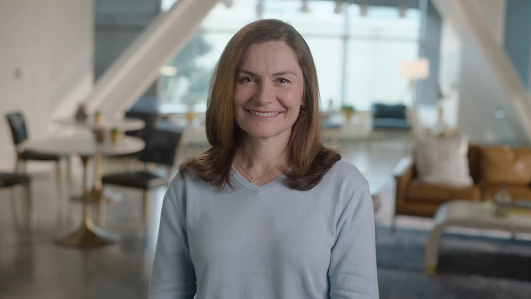Connect with your audience across moments, screens, and formats
Google AI-powered video campaigns deploy your ads across a custom mix of YouTube’s in-stream, in-feed, and Shorts environments—and on connected TV, desktop, and mobile. This mix is uniquely determined based on your inputs—like creative and audience—and, most importantly, your business objective. Get started with these best practices:
Start with your objective in mind.
Why: Knowing your media objective will guide you to the right video ad campaign type and give Google AI the information it needs to help you achieve that objective.
If your objective is awareness, choose Video reach campaigns.
Why: Whether your specific goal is reach, ad completions, or reach at a specific frequency, Google AI in Video reach campaigns helps optimise the video assets you provide to deliver on your reach goal in the most cost-efficient way.
Proof Point
Learn more about using Video reach campaigns.

If your objective is consideration, choose Video view campaigns.
Why: Video view campaigns let you seamlessly scale across in-stream, in-feed,
and YouTube Shorts to get the most views possible, at the lowest cost.
Proof Point
If your objective is driving online conversions, choose Video action campaigns.
Why: Video action campaigns automatically scale your video ads with prominent calls-to-action on destinations across all YouTube surfaces and its partners. This provides you a simple and more cost-effective way to drive website traffic, leads, and conversions.
Proof Point
Learn more about using Video action campaigns.
Simplify video creation with Google AI
AI-powered advertising solutions can assist you with the creation and adaptation of videos for YouTube’s wide range of ad formats and viewing environments. Using a variety of formats, like vertical video ads for YouTube Shorts, helps maximise your reach and impact. Two solutions available today for Performance Max and App campaigns, with more campaign types coming soon, make this a breeze:
- A video generation technology that repackages existing assets into new vertical, horizontal, or square video ads: It transforms existing static images, text, Google Merchant Center or app-store listing assets into video ads. More video assets in a campaign means more ways to reach people with the right ad, in the right environment.
- A technology that flips horizontal videos into vertical or square videos: All the critical visual elements that tell your story are preserved.
Whether you create your own assets or have Google AI assist you, having ads in multiple orientations is important to maximise performance across all campaign types.
Proof Point

With the growth of YouTube Shorts, it’s even more important to have a vertical asset that matches the vertical viewing environment.
Proof Point
Enhance creative assets to follow video ad best practices
YouTube’s six-second bumper ads are essential for driving reach and frequency. To generate great bumpers at speed, use Trim video (formerly known as Bumper Machine). Trim video uses machine learning models to transform your long videos into shorter ones, so you can make three or four six-second bumper ads in just a few minutes. The models are trained on the ABCD guidelines for effective YouTube ads, so you can be sure the bumpers it produces are optimised for YouTube.
Another ABCD best practice is to use audio, specifically voice-over, to reinforce your brand and message. To make sure all of your ads tap into the benefits of YouTube’s sound-on environment, you can easily add a voice-over to any ad. Just type your script, choose a voice, and let Google AI do the rest.
Article footnotes:
1 YouTube VRC Campaign Meta Analysis, Global, Oct 2019 - Feb 2021. Data from n=33 video experiments *vs manually managed campaigns.
2 Google Data, Global, Product Performance, VVC vs TrueView in-stream h2h tests conducted in Jan-Feb 2023
3 YouTube Internal Data, Global, May-June 2022
4 Google Internal Data, Global, November 2022
5 Google Internal Data, Global, November 2022
6 Google Internal Data, Global, May 1-June 1, 2022


